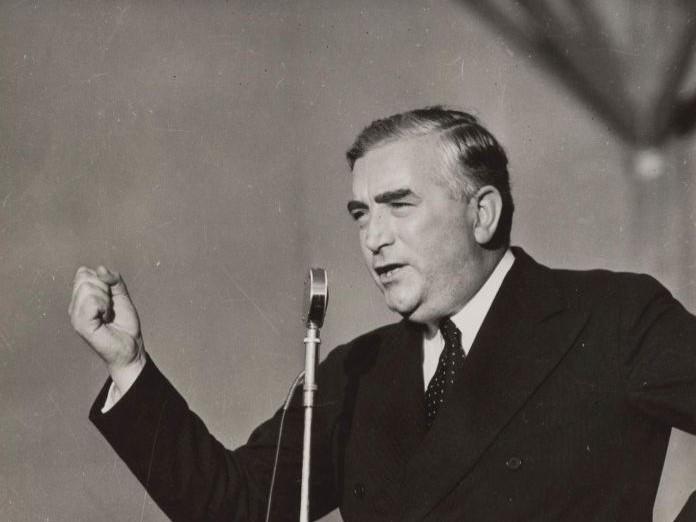Oz voice in the Asia–Pacific (part 1): speak for ourselves
Posted By Graeme Dobell on July 9, 2018 @ 06:00

Launching Australia’s international radio service in December 1939, Prime Minister Robert Menzies declared: ‘The time has come to speak for ourselves.’ [1]
World War II woke Australia to the need for its own, distinctive international voice. Our journalism would matter for our regional role as much as our diplomacy. Today Canberra needs to be convinced anew of the value of our journalistic voice in the region, with an inquiry underway on Australia’s media reach in the Asia–Pacific [2].
Quoting Menzies at a Liberal government is always a good tactic, so here’s another bit of the founding father, from April 1939:
I have become convinced that, in the Pacific, Australia must regard herself as a principal, providing herself with her own information and maintaining her own diplomatic contacts with foreign powers … It is true that we are not a numerous people, but we have our vigour, intelligence and resource, and I see no reason why we should not play not only an adult, but an effective part in the affairs of the Pacific.
At one level, Menzies is offering what’s still a statement of the bleeding obvious.
Yet, when it comes to an Oz voice in the Asia–Pacific, Australia has largely ceased using media power [3] to play an intelligent and effective part in the affairs of our region [4]. In the words of one of the smartest journos I know, Australian programming for regional audiences is simply ‘risible’ [5].
As this column has been arguing, the inquiry is a chance to reverse a strange and silly desertion of a vital arena. It’s time for Australia to speak for itself and get back into the journalism game, to revive a proud international history that stretches back to 1939.
We don’t face war, but trying times certainly demand a distinct Oz voice. Menzies would raise one of his famous eyebrows that we even need to have this argument.
The terms of reference for the inquiry have a useful fuzziness in defining the media arena. The heading of the document refers to a ‘Review of Australian Broadcasting Services in the Asia Pacific’. But broadcasting is being investigated in the widest sense: the terms of reference mention shortwave, analogue, digital and satellite radio and television services and online services.
Such fuzziness/broadness is proper, because all media technologies are converging. Broadcasting is publishing. TV and radio are vision and audio online. The digital revolution both unites and atomises. For media and journalism, the distinction between domestic and international coverage is fading.
When Australia draws the proper Menzian conclusion about the requirement to speak for itself and contribute to the region, the voice Menzies launched in 1939 still offers much. That shortwave service, Australia Calling, became Radio Australia after the war, and since 1950 RA has been part of the Australian Broadcasting Corporation.
The Australian government rethink on Asia–Pacific journalism must be matched by a revived and renewed ABC focus on international broadcasting, using ‘broadcasting’ in its broadest, converging-media sense.
The rundown of our international journalism—by both government and the ABC—is tragic evidence of the truth that there’s no big domestic constituency for good foreign policy. But the whole nation pays for bad foreign policy. And Australia has to reverse bad policy to get back into speaking for ourselves. The commitment must be both big and permanent.
When the Coalition government killed off funding for international TV in 2014, a communications minister named Malcolm Turnbull argued that there was no need for the Oz voice in a crowded regional arena. If people wanted international stuff, Turnbull said, they could go to the BBC or CNN.
The ghost of Menzies would have raised both eyebrows, because Menzies said the purpose of getting close to great and powerful friends was to bolster our interests, not hand ’em over—insurance policy, not giving away the store.
As prime minister, the same Malcolm Turnbull has increasingly come round to the ‘speak for ourselves’ understanding.
In one of his key foreign policy speeches [6], at the Shangri-La Dialogue last year, Turnbull reflected on how the digital revolution breaks down national boundaries and distance:
Technology has connected local aspirations and grievances with global movements. Hyper-connectivity has amplified the reach and power of non-state actors, forcing us to reassess how we, as nation states, assert and defend our sovereign interests. Last month’s ransomware cyberattacks confirmed that the world is still coming to terms with the new threats and vulnerabilities.
Now, in this brave new world we cannot rely on great powers to safeguard our interests. We have to take responsibility for our own security and prosperity while recognising we are stronger when sharing the burden of collective leadership with trusted partners and friends.
The gathering clouds of uncertainty and instability are signals for all of us to play more active roles in protecting and shaping the future of this region.
Take responsibility. Don’t expect the great powers to safeguard our interests. Act to shape the future of the region. Menzies would nod at this description of the value of a powerful Australian broadcasting voice.
Article printed from The Strategist: https://aspistrategist.ru
URL to article: /oz-voice-in-the-asia-pacific-part-1-speak-for-ourselves/
URLs in this post:
[1] ‘The time has come to speak for ourselves.’: http://about.abc.net.au/press-releases/abc-radio-australia-celebrates-70-years-broadcasting/
[2] Australia’s media reach in the Asia–Pacific: https://www.communications.gov.au/have-your-say/review-australian-broadcasting-services-asia-pacific
[3] ceased using media power: /hello-21st-century-australia-calling/
[4] part in the affairs of our region: /hard-news-as-the-sharp-edge-of-oz-soft-power/
[5] ‘risible’: /crowded-pacific-re-considering-sharp-edge-broadcastings-soft-power/
[6] key foreign policy speeches: https://www.pm.gov.au/media/keynote-address-16th-iiss-asia-security-summit-shangri-la-dialogue
Click here to print.